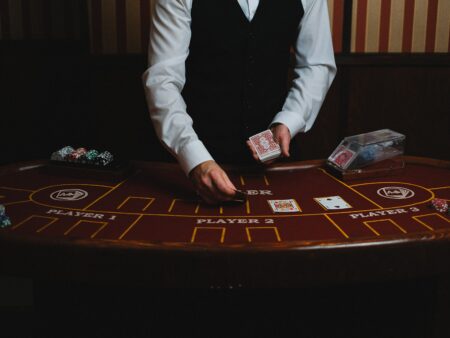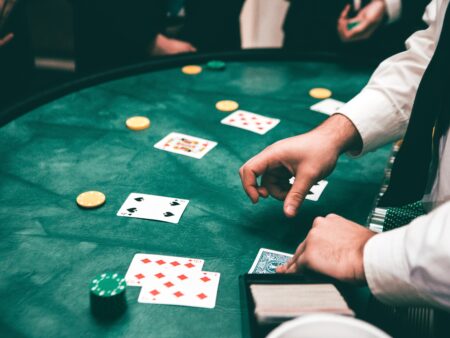For beginners: Recipe for success
What is the key to success? What makes some people poker masters and others constant losers? How to play to win?
We are trying to answer these questions in this material.
When you start playing Texas Hold’em, you can choose three types of poker: fixed limit, pot limit and no limit. According to the majority of poker experts, it is advisable to start from fixed limit. It is determined by the imposed number of permissible bet raises, which causes mistakes to be less costly. Beginners cannot go bankrupt in one deal.
Pot limit, and particularly no limit, is a „cadillac of poker”, that is the highest form of poker. Many believe that Texas Hold’em in no limit variant is almost like the art. Remember however that even the greatest champions were once beginners, after all even a poker master must take its first step.
If you have never played poker online, it is advisable to visit a training table which carefully reflects real game for real money. Remember however that people behave in one way when they cannot lose anything, and in other way when they risk their real money, so you can only get familiar with the nature of the software and online play by the training table.
You are thus ready to start fighting for real cash. What is the recipe for success in poker?
7 rules to be followed to win in fixed limit
- Be patient
Be patient, carefully choose first two starting hands, never get tempted and involved in too many deals. Fold cards when it seems that your cards are weaker than your opponent’s. With time you will be able to play at 2, 3 or more tables at a time to take part in more deals. Patiently wait for your hand, be disciplined, it will pay off in the long run. - Choose a suitable table and have long-term thinking
Always choose tables attended by worse players than you. Try to pick loose-passive tables, avoid tables with flop view rate below 30%, and in particular tight-aggressive tables. Remember that Texas Hold’em is a game of skills but only in the long term. In short term anyone can win and with any card, even 72 off suit. Your goal is to to win in the long term, in a short term you are doomed to your fate. Try not to get nervous with terrible bad beats (deals which you should have won, but due to unbelievable bad luck, your opponent was better). - Be disciplined and put your ambitions aside
If you already know how to play, always try to stick to your strategy. When you have a feeling that you are patient and try to keep a long-term thinking but you still cannot deal with another bad beat or lucky river of your opponent, finish the game and have a break. Sometimes the simplest solutions prove to be the best – switch off your PC and get some fresh air, these may be perfect ideas. Do not play when you are tired or irritated with some everyday matters or if you have just come back from a drunk party. Do not get too ambitious, do not try to win at all costs if you have lost in the previous deal. Do not intend to take revenge. If other players are stronger, change the table. - Get familiar with your opponent
Carefully watch your opponents, and pay attention to their style. Whether they are careful and tight-aggressive, or quite the contrary – aggressive maniacs who raise the stake regardless of their cards. Or maybe some of your opponents is a rock, that is the player who plays only when it has a very strong hand?
Carefully watch and realize what kind of player you are competing with and you will be able to make right decisions. - Assure a suitable bankroll management
To make sure you do not get bankrupt, skillfully manage your budget based on a few simple rules. When you play at tables 0,5/1$ fixed limit, your budget is at least 300$, optimally 500$. You join the table with 50$ (50 x big bet), when you lose 30$ or more (30 x big bet), you call it a day. When together with bonuses and profits from the game you draw further 100 – 200 big bet, go to tables with a higher limit. When you lose what you have earned before, go back to the lower limit and win until you can be able to play at tables with a higher limit again. If you lose 500$ at tables 0,5/1$, Texas Hold’em is not the game for you. Remember that managing your own capital will pay off only if you are a winning player – otherwise nothing can save you. - Avoid the most common mistakes
Do not fall into „trap hands” that is traps which are highly likely to become the second-best hand if certain conditions are met. Most frequently it is a matter of a weak kicker (kicker – the second, weaker card next to the first strong one, e.g. 4 in the hand: K-4), which in the long term will be very expensive. Additionally, going for a quasi-high hands, like QJ, in an unsuitable position or after raise in the long term will be highly costly. Remember also to check if the value of the pot justifies the specific bet. Count outs (potential cards which may strengthen your hand), know which of them are false outs (strengthen your hand but can also strengthen your opponent’s hand even more). Do not bend statistics. Remember that another deal comes in a few or a dozen seconds. - Do not bluff
Bluffing in a low limit is often a bad choice. Do not make this mistake and just do not bluff. You can resort to semi-bluff in some situations. An attempt to force a weak player to fold is almost always a bad idea: even if his kicker is worthless or when he plays with trash hands (like 7-2), it is almost certain that he will check your cards. Do not try to be a bluffing master in low limit Texas Hold’em, it is pointless.
To finish with, we would like to stress that our suggestions are only basics. If you would like to expand your knowledge of poker, choose professional literature, visit dedicated websites and discussion forums. We advise you to enter the website designed for all poker enthusiasts who treat it as a sport.
Analyzing your performance, draw conclusions, adapt your playing style to your opponent’s, only then do you have a chance of becoming another poker champion.




